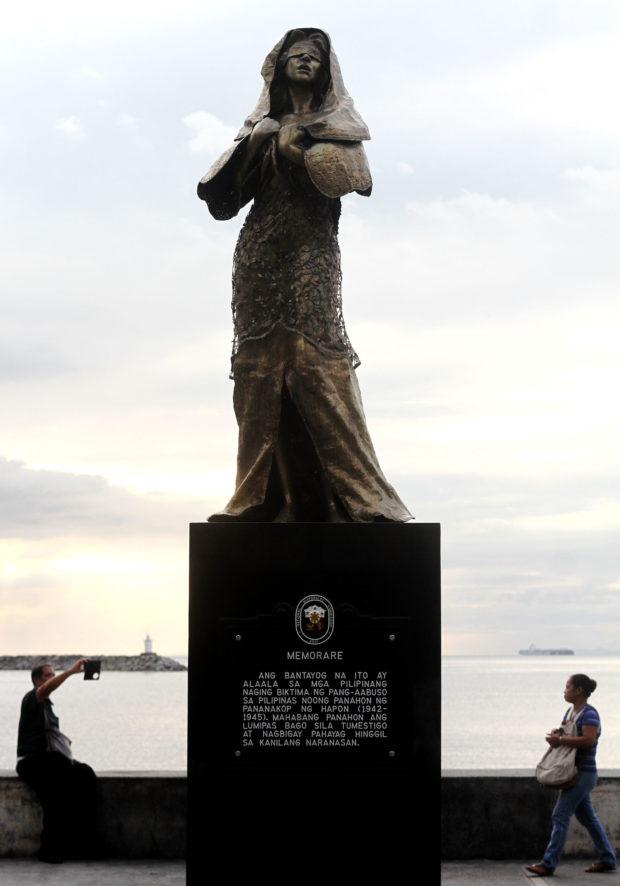
“Comfort Women” statue on Roxas Boulevard in Manila—RICHARDA. REYES
A women’s rights group challenged presidential spokesperson Harry Roque on Thursday to defend the Filipino “comfort women” in the controversy over the erection of a historical marker symbolizing the former World War II sex slaves near the Japanese Embassy along Roxas Boulevard in Manila.
Rep. Arlene Brosas of Gabriela Women’s Party said her group expected Roque to make a stand because he had served as lawyer for Malaya Lolas, a group of Filipino women forced into sexual slavery by Japanese troops during the war.
“Maybe Roque is waiting for other sectors and [people] to speak, but we are expecting that he would react,” Brosas told a news conference in Quezon City.
“We have to push him to speak publicly about this. He needs to say his stand upfront,” she added.
Irrelevant
But Roque said his former role as lawyer for Malaya Lolas was irrelevant now. His role now is to speak for President Duterte, he told reporters.
The historical marker, which includes a 2.1-meter statue of a blindfolded woman with a shawl covering her head and with both hands clutching her clothes to her chest, was unveiled last Dec. 8 on a promenade along Roxas Boulevard near the Japanese Embassy.
It was commissioned by Tulay Foundation, a group of Chinese-Filipinos based in Manila, and done by artist Jonas Roces as a tribute to the Filipino women who were forced into sexual servitude by Japanese occupation forces during the war.
The statue raised hackles at the Japanese Embassy, which asked the Department of Foreign Affairs (DFA) and the Manila city government for explanations.
Roque said the matter was not a diplomatic issue and President Duterte would not act on it.
Japan displeased
Japanese Internal Affairs and Communications Minister Seiko Noda was in Malacañang on Tuesday and told reporters that she had conveyed Japan’s displeasure over the statue to Mr. Duterte.
Roque did not confirm Noda’s statement. He said not all bilateral discussions could be reported or commented on. He referred to a Palace press release on the meeting between Noda and Mr. Duterte that only mentioned the minister thanking the President for taking the time to meet her.
“I don’t think it is really a diplomatic issue because our ties with Japan remain strong. We have every reason to be optimistic that bilateral relations with Japan will become even stronger,” he said.
Japan, a major economic partner of the Philippines, is the country’s top source of official development assistance.
Asked what the administration would do about the statue, Roque said none.
“The statue [was] not erected by Malacañang. What are we supposed to do?” he said.
“It’s not something that the President will act on himself,” Roque said. “We didn’t erect the statue so it’s not a presidential project.”
Ask NHCP
He said any concern should be brought to the National Historical Commission of the Philippines (NHCP), which allowed
Tulay Foundation to erect the statue along Roxas Boulevard.
The matter may also be raised with Manila Mayor Joseph Estrada, Roque said later.
Estrada and NHCP Executive Director Ludovico Badoy attended the unveiling of the statue.
The Manila city administrator, Jojo Alcovendaz, pointed to the NHCP as the approving authority behind the statue.
He said the DFA had asked the city government to explain the statue.
No explanation needed
On Thursday, Brosas said the Philippines did not have to explain the statue to Japan.
“Loans and financial assistance from Japan [do] not give them the right to direct or persuade us not to commemorate the horrors Filipino women faced during the Japanese occupation [of] the country,” Brosas said.
She said the NHCP also did not have to explain the statue.
“Why does the NHCP need to explain when it is an established fact in history that Filipino women were abused, repeatedly raped and killed during the Japanese occupation,” she said.
“It is nothing but the right to instill in today’s generation the dark time that we went through under Japanese [occupation] forces,” she added.
An estimated 1,000 Filipino women were conscripted into Japanese military brothels during the war.
According to Lila Pilipina, an organization of former comfort women, about 20 of some 200 women who had surfaced to tell their stories still survive.
Thousands of women in other Asian countries, including Korea, were forced into sexual slavery by Japanese occupation forces.
Japan has not officially acknowledged the comfort women and it has not apologized to them.
It is sensitive about the matter. Last September, the unveiling of a comfort woman statue in San Francisco, California, angered the mayor of Osaka, Japan, who vowed to cut his city’s sister-city ties with San Francisco.